Reb MacRath's Blog, page 15
August 17, 2015
Second Thoughts On Second Drafts

I'd gotten that part down well enough that I no longer anguished even when I knew something wasn't working in my first 'pass' through a novel. Let's raise our cups to Hemingway who put it with more pith:
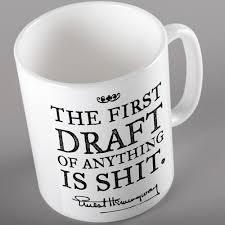
At the same time, let's remember that many pros refer to the first draft as the Vomit Draft:
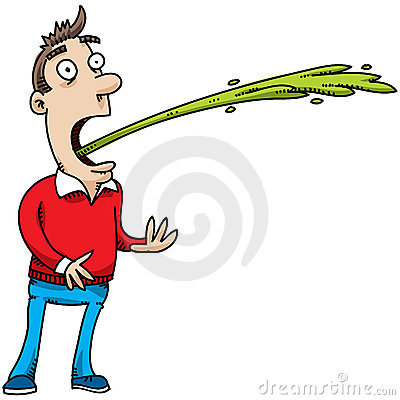
And Ernie Mears has given what I regard as the best definition:
vomit draft: (n) 1. writing draft in which the author spews words on the page in a chaotic outpouring of ideas, characters, plot, passion, and quite possibly last week’s dinner; 2. the art form of funneling the maelstrom of inspiration in one’s brain into a porcelain throne of paper; 3. in which a writer commits a story to paper for the first time, therein relating it to herself. synonyms: first draft, rough draft. antonyms: polished piece, final draft, completed manuscript.
That said, at the very least, we've got ourselves a book--right? Wrong. Whether you see it as vomit or as very raw material, you have something that may become very important...with work. But what you don't have is a book.
Well, okay, okay, okay. But, hey, at least the hard part's done--right? Wrong. The second draft, for me, has always been the hardest. Daily, I have to face the reeking stylistic mess. Daily, I see again that almost every page contains twice the needed word count. The pacing is off. I'm telling and not showing. Characters still aren't developed enough. The fact is, almost everything that could go wrong with a good novel lies before the writer in a reeking puddle of vomit. And this is an excellent time to reflect: with every pass through a novel it grows harder to spot what is wrong--try to spot the Biggies now.
Still, something cool happened in the second draft of Caesar's Ghost, my WIP. I abandoned all thoughts of perfection in this pass. I squeezed every drop of defeatism and shame from my soul. If the second draft still sucked, so what? So what if took me three more drafts...or five? No one would see the book until I ready to show it. So why not enjoy this pass, working with humbler goals:
--Work calmly, daily, without stress--from a hard copy of the text.
--Cut only verbiage that is obviously excessive.
--Focus on pacing, logistics and clarity.
--Don't think about stylistic razzmatazz. But do accomplish in this pass a professional level of prose.
--Make notes for any challenge that can't be resolved at this time.
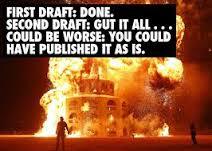
Well, okay, okay. But then the second draft's done. And, relatively speaking, the third draft should be a cake walk--right? Maybe right...but maybe wrong. Depends on what your values are and how good a writer you hope to become.
Three drafts will be enough for some and one too many for others. Still others may need four or five. But if you do decide on a third, let the third be extra-special. With all that has been cleared away, you may spy new opportunities--for a plot twist or a character or a turn of phrase. Nothing is final until you sign off. So allow yourself at least one more pass...with a world of potential before you.
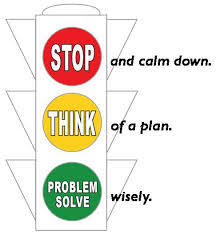
Published on August 17, 2015 06:00
August 9, 2015
The Too Wild to Not Be Reviled: De Palma
True blue rebels even turn, now and then, on their most loyal fans. Not from ingratitude or spite, but to keep things real. A rebel who's predictable is really no rebel at all: e.g., rappers or rockers who cultivate rebel personae while carefully singing whatever will sell and protect their position on Forbes' list.

But the Real Deal we have gathered to celebrate today is cut from different cloth. He is at once reviled and revered...brilliant auteur and pure bad boy...blockbuster maestro and crafter of smaller, more personal gems. His name is Brian De Palma and you're certain to have heard of or seen at least a few of his most famous films: Carrie, The Fury, Dressed to Kill, Blow Out, Scarface, Body Double, The Untouchables, Carlito's Way, Mission Impossible...

These are wildly disparate films, you'll agree. And De Palma becomes even more difficult to peg if you consider: he began, back in the Sixties/early Seventies, with small, subversive films (Greetings, Get to Know Your Rabbit)...he then moved on to films inspired by Hitchcock (Sisters, Obssession)...he graduated to classic De Palma-style films with now-patented camera techniques...he befuddled fans and critics by intermingling blockbusters--Scarface, The Untouchables, Mission Impossible--with smaller, more classically De Palma-style movies--Body Double, Raising Cain, Snake Eyes, Femme Fatale, Passion...and to shake things up even more, he put out the occasional misfire: Bonfire of the Vanities, Wise Guys, the Black Dahlia...
No matter what he did, though, two things could be counted on: bubble-headed critics would still call him a clone of Alfred Hitchcock with an obsessive interest in voyeurism and kinky sex,..and the hardest core De Palmians would stand by their man.
Until...Well, every story has one...Until he put out a completely non De Palma movie entitled Mission to Mars. And you'll have to travel far and wide to find a movie this reviled.
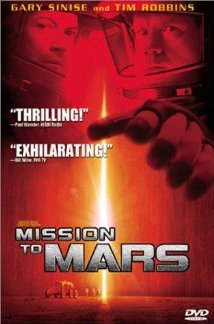
I mean, really, imagine a De Palma Movie with just one splashing bloody sequence, no kinky sex and almost no trademark camera work, What is about? Well, it combines, quite wonderfully, elements of Gravity, Interstellar and the upcoming movie, The Martian. We begin, Interstellar-like, with a sequence set on earth, in which we get to know the characters. The 15 minutes are well-spent. The flight to Mars is shown in an interesting compression of time. The astronauts land, explore--and are gruesomely dispatched by--we cannot be certain if it's a force of nature or...maybe an alien presence. A rescue team is sent. Lovely scenes aboard their craft until the rocket springs a leak. Gravity-style repair work. Not entirely successful. Exquisite suspense and a heartbreaking loss as they abandon ship and try to reach the dispatched rescue vehicle. They land...search...find graves, indicating someone's still alive. And then...
Now comes the movie's first big surprise--which I won't reveal. Another, still bigger, is coming. What I will say is that, in a two-hour film, the structure and pacing are both spot-on. The acting and scripting are equally good. ('I didn't travel 100 million miles to stumble in the last ten steps.' Or: when chided because he can't dance, the hero tells his wife: 'Hey, some couples tango and some go to Mars.') The movie's inner Swiss watch ticks as we advance on schedule to the Big Reveal.

As for the last fifteen minutes...Here we come to the great I Don't Know. I didn't like the ending. I'd wanted something different. Many viewers have hated the ending and condemned the entire film because of it. Stand back, though. We can't have it all ways.
We can't have a Real Deal Rebel who's been completely housebroken and repeats all the tricks we love best, at our call. The Real Deal is subversive and loves to thwart expectations. The Real Deal will transform a kinky, borderline sleazy film like Femme Fatale into a dream, onto which he then tacks on a lush, romantic ending. The Real Deal, late in his career, with thwart all expectations with a beautifully calm thriller, Passion.
Because he refuses to 'heel' on command, we should never grow too comfortable in the presence of such an artist. The best are loving people--with a streak of junkyard dog.

But relax. They're not out to hurt but delight us as they take us by the throat. Now and then they succeed at that by showing us their hearts.

But the Real Deal we have gathered to celebrate today is cut from different cloth. He is at once reviled and revered...brilliant auteur and pure bad boy...blockbuster maestro and crafter of smaller, more personal gems. His name is Brian De Palma and you're certain to have heard of or seen at least a few of his most famous films: Carrie, The Fury, Dressed to Kill, Blow Out, Scarface, Body Double, The Untouchables, Carlito's Way, Mission Impossible...

These are wildly disparate films, you'll agree. And De Palma becomes even more difficult to peg if you consider: he began, back in the Sixties/early Seventies, with small, subversive films (Greetings, Get to Know Your Rabbit)...he then moved on to films inspired by Hitchcock (Sisters, Obssession)...he graduated to classic De Palma-style films with now-patented camera techniques...he befuddled fans and critics by intermingling blockbusters--Scarface, The Untouchables, Mission Impossible--with smaller, more classically De Palma-style movies--Body Double, Raising Cain, Snake Eyes, Femme Fatale, Passion...and to shake things up even more, he put out the occasional misfire: Bonfire of the Vanities, Wise Guys, the Black Dahlia...
No matter what he did, though, two things could be counted on: bubble-headed critics would still call him a clone of Alfred Hitchcock with an obsessive interest in voyeurism and kinky sex,..and the hardest core De Palmians would stand by their man.
Until...Well, every story has one...Until he put out a completely non De Palma movie entitled Mission to Mars. And you'll have to travel far and wide to find a movie this reviled.

I mean, really, imagine a De Palma Movie with just one splashing bloody sequence, no kinky sex and almost no trademark camera work, What is about? Well, it combines, quite wonderfully, elements of Gravity, Interstellar and the upcoming movie, The Martian. We begin, Interstellar-like, with a sequence set on earth, in which we get to know the characters. The 15 minutes are well-spent. The flight to Mars is shown in an interesting compression of time. The astronauts land, explore--and are gruesomely dispatched by--we cannot be certain if it's a force of nature or...maybe an alien presence. A rescue team is sent. Lovely scenes aboard their craft until the rocket springs a leak. Gravity-style repair work. Not entirely successful. Exquisite suspense and a heartbreaking loss as they abandon ship and try to reach the dispatched rescue vehicle. They land...search...find graves, indicating someone's still alive. And then...
Now comes the movie's first big surprise--which I won't reveal. Another, still bigger, is coming. What I will say is that, in a two-hour film, the structure and pacing are both spot-on. The acting and scripting are equally good. ('I didn't travel 100 million miles to stumble in the last ten steps.' Or: when chided because he can't dance, the hero tells his wife: 'Hey, some couples tango and some go to Mars.') The movie's inner Swiss watch ticks as we advance on schedule to the Big Reveal.

As for the last fifteen minutes...Here we come to the great I Don't Know. I didn't like the ending. I'd wanted something different. Many viewers have hated the ending and condemned the entire film because of it. Stand back, though. We can't have it all ways.
We can't have a Real Deal Rebel who's been completely housebroken and repeats all the tricks we love best, at our call. The Real Deal is subversive and loves to thwart expectations. The Real Deal will transform a kinky, borderline sleazy film like Femme Fatale into a dream, onto which he then tacks on a lush, romantic ending. The Real Deal, late in his career, with thwart all expectations with a beautifully calm thriller, Passion.
Because he refuses to 'heel' on command, we should never grow too comfortable in the presence of such an artist. The best are loving people--with a streak of junkyard dog.

But relax. They're not out to hurt but delight us as they take us by the throat. Now and then they succeed at that by showing us their hearts.
Published on August 09, 2015 12:00
July 26, 2015
The Good and The Too Wild to Not Be Reviled: Intro
For your appallment, despair and delight...This periodic thread on a subject I've studied for decades: the bad boys who count in the arts are not always the obvious choices:

Charles Bukowski
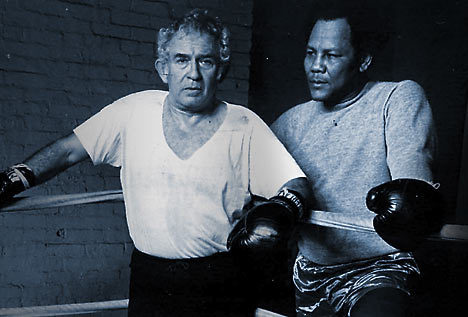
Norman Mailer

Martin Amis
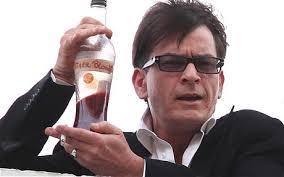
Charlie Sheen

Just one of the world's richest gangstas
An impressive rogue's gallery, I'll admit. But it's easier to look and behave like an outlaw to gain fame and riches than to brave ridicule and revilement by stubbornly going one's way. Here we will honor members of an exclusive club: The Too Wild to Not Be Reviled. Only one man in the following list of American directors can claim to be a member.
The five men were contemporaries whom Susan Dworkin called the Whiz Kids: a 'central generation in American filmmaking...raised on the notion that the real auteur of a good movie had to be the director'. You know their names if not their faces:

Stephen Spielberg
[image error]
Francis Ford Coppola

George Lucas

Martin Scorcese
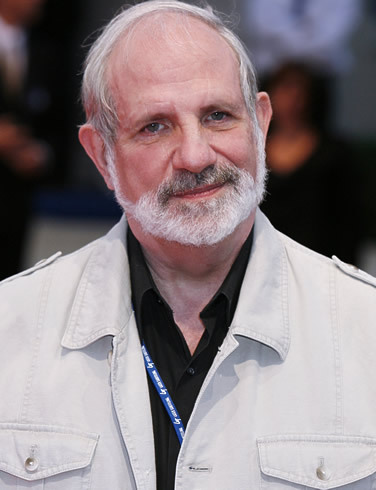
Brian De Palma
One honest outlaw and real rogue in the bunch--and, not coincidentally, the single most reviled. The creative force behind Carrie, the Fury, Scarface, Blow Out and the notorious Body Double--aka 'the driller killer/porn film'--plots real bad boy chaos while drinking coffee or water and playing Trivial Pursuit.
He'll be our first subject. And from there we'll swing the spotlight to others you may not have thought Too Wild to Not Be Reviled.


and...?
Stay tuned!

Charles Bukowski

Norman Mailer

Martin Amis

Charlie Sheen

Just one of the world's richest gangstas
An impressive rogue's gallery, I'll admit. But it's easier to look and behave like an outlaw to gain fame and riches than to brave ridicule and revilement by stubbornly going one's way. Here we will honor members of an exclusive club: The Too Wild to Not Be Reviled. Only one man in the following list of American directors can claim to be a member.
The five men were contemporaries whom Susan Dworkin called the Whiz Kids: a 'central generation in American filmmaking...raised on the notion that the real auteur of a good movie had to be the director'. You know their names if not their faces:

Stephen Spielberg
[image error]
Francis Ford Coppola

George Lucas

Martin Scorcese

Brian De Palma
One honest outlaw and real rogue in the bunch--and, not coincidentally, the single most reviled. The creative force behind Carrie, the Fury, Scarface, Blow Out and the notorious Body Double--aka 'the driller killer/porn film'--plots real bad boy chaos while drinking coffee or water and playing Trivial Pursuit.
He'll be our first subject. And from there we'll swing the spotlight to others you may not have thought Too Wild to Not Be Reviled.


and...?
Stay tuned!
Published on July 26, 2015 07:30
July 11, 2015
La Dance Diabolique: A Red Hot Boogie Woogie

Joining us today are six hot rising stars to discuss the relationship between writers and their audience. In alphabetical order:
Debbie Bennett
Tells lies and makes things up in dark and gritty crime thrillers inspired by her day job – but if she told you about that, she’d have to kill you afterwards…
Ryan Holt
Screenwriter and film enthusiast. He manages the film blog I’ve Seen That Movie Too and was most recently published in the third volume of Faith and Spirituality in Masters of World Cinema.
Wendy Jones
Born in Dundee, the setting of her crime novels, Killer's Countdown and Killer's Craft. Wendy has served in both the Army and the Royal Navy.
Valerie Laws
Crime and comedy novelist, poet, playwright,performer, sci-art installations & commissions.
Chris Longmuir
Author of four crime novels, a historical saga, and a nonfiction reference book, Crime Fiction and the Indie Contribution.
David North-Martino
Author of Wolves of Vengeance. His short stories have appeared in numerous fiction venues including: Epitaphs, Inner Demons Out, and Daughters of Icarus.
*****
Dance Warmup

Recently, I was admonished for stating that I've grown more mindful of readers' reactions when I'm revising a book. The other writer took this as a way of 'selling out', claiming that he goes wherever his story may lead without any thoughts of his readers. When I'm revising, though, I'm not censoring--I'm tightening my grip: fine-tuning to get the reactions I want. E.g.: I reduced the number of 'F' bombs in MonsterTime because, I felt, a thousand bored...whereas one might shock. (Stephen King proved this in Misery: the cussing-hating Annie Wilkes swears just once--but big-time--at the very end.) This difficult, delicate act we all do I call La Dance Diabolique. And I now turn the floor over to you.
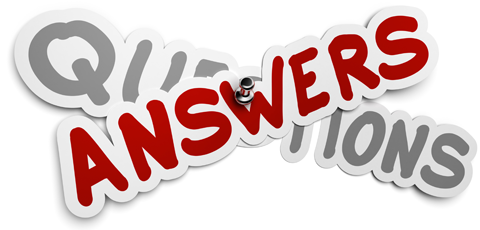
1) To begin at the beginning...What do you see as the ideal relationship between you and your readers? Are you friends...collaborators...even co-conspirators?
Bennett
Depends on the readers! I have readers who are friends – and friends who are readers. I have readers who have Friended me on Facebook and readers who I’ll never know about. But writing for publication is different from simply writing. Writing for publication is a business relationship: I write stories and readers pay money to read them. If/when they stop paying money, I will doubtless rethink my strategy here! I have been known to include ideas and suggestions from friends – my main beta reader is a guy who got in touch after book 2 in my series and told me what he thought should happen in book 3 and how all the loose ends should be tied up. I asked him if he’d like to read it as I was writing it and feel free to make suggestions. So he did and he’s been the devil-on-my-shoulder ever since, telling me what works and what doesn’t. But, generally, sharing too far pre-publication doesn’t work for me – it dilutes both energy and self-confidence.
Holt
The best metaphor is that of a conjurer and his audience.
An author is one who knows the secret power of words. He coordinates those words to produce a magical effect. The process is inherently risky, fraught with dangers and difficulties. Words are far too strange and peculiar to ever truly master them. But the author knows enough to find his way.
The readers are the conjurer’s audience, looking on in the hopes of glimpsing some great power.
Jones
The readers are an integral part of the process for me. Although I don’t know then personally, they seem like friends. Friends I’ve never met, if that makes sense. When I read a good book I feel that the author has given a part of him, or her, self to me and I would like the reader to feel like this when they finish the book.
Laws
I do write to be read and to reach people, and I strive to make my work engaging and accurate because I write when I have something I feel needs to be said or explored, a story to be told, a voice to be given to someone or something voiceless. I see my readers as people I might affect, make laugh or cry, or feel something or see something in a new way. I suppose I see my readers as an audience perhaps more than anything, though individuals who respond to my work are an important part of the process for me. I like to entertain and be accessible as long as it serves my purpose in a particular poem, novel or play or installation. I write to express ideas that come to me and I like to share them for the same reasons I read other writers’ work or go to galleries or theatres, to expand my view of the world.
Longmuir
Before I start to look at the nature of the relationship between an author and their readers, I think it is important to acknowledge that, although writing is a hobby for many authors who write to suit themselves, once an author has become professional they are then providing a service. A professional author provides the service to his customers, the readers, and that being the case there is a duty to provide the best service possible. This means that the nature of the relationship is dependent on whether the author is a hobby writer, or a professional.
On the other hand, I’m not sure you can pigeon hole the relationship between authors and readers. although I would rule out collaborators and co-conspirators. In some cases readers may become friends, but in most cases they are an author’s customers and it is the author’s job to provide them with a service. But I would rather think of them as readers rather than customers, and my relationship with them is to listen to what they want, and provide it the best way I can.
Obviously when I meet readers at events, the relationship is friendly, but this does not make them friends, and I don’t think most readers would want that, although there is always the exception.
North-Martino
My goal is to connect with as many readers as possible. If that’s selling out, so be it. I feel my job, as a writer, is to create a story that resonates with my readers. To resonate with as many readers as possible you have to create stories and situations within those stories that are timeless, situations in which everyone can relate. I also look at writing as work first, art second.
I think it all depends on your goals. Some writers are happy writing fiction to a niche audience. Writing an extreme horror novel, for instance, will cater to a much smaller group of readers than a mainstream thriller.
You also have to be a truth teller. Not your truth, but the truth of the story. The story is trying to say something, and you have to let it say what it wants without interference.
2) Why should you, or should you not, be mindful of your readers?
Bennett
My first crime novel Hamelin’s Child acquired me a big London agent. Over coffee in her posh London premises, we discussed whether or not I should leave in a graphic rape scene. I felt it was cheating the reader (and the character) to leave it out as it’s a pivotal plot point and not in any way gratuitous in my opinion. She agreed with me. Since subsequently self-publishing, I have had only one negative review that was down to that scene but the reader hated everything else in the book too – as she was perfectly entitled to do so, I should add. I have no quarrel with bad reviews. So I think (I hope) that I estimated reader-reaction reasonably well – I was counting on earlier scenes to establish my character and create enough empathy for the reader to go with him through the bad stuff and out the other side. I guess in that sense, I was mindful of my readers, yes. But I would never not include something I wanted to write because I was worried about reader reaction.
Holt
There is a school of thought that says that considering your audience is equivalent with artistic compromise. This perspective so completely ignores the history of storytelling, where stories were not simply individualist art projects but were actually the bedrock of an entire society. Besides, we’d certainly never criticize a father telling his child a bedtime story for keeping his child’s interests and desires in mind. Certainly we shouldn’t do the same of an author who chooses to craft a story specifically for his readers.
This is not to say that a writer needs to keep anyone else in mind besides his or her self. After all, the author is the primary reader and critic of any work he or she produces. Many of the great writers simply followed their own desires and fixations (look at Joyce or Proust).
But, if we hold to the metaphor of author-as-conjurer, should a conjurer wish to display his skills, then he or she will no doubt wish to demonstrate good showmanship. To put on a good show, you have to be able to read the crowd. A great many authors have demonstrated concern in this direction, as well, without artistic compromise (Dickens being the obvious example).
In the context of writing, good showmanship means that everything has been coordinated according to the appropriate effect. Showing restraint with violence or sexuality or profanity isn’t about censorship as much as it is about aesthetics. It’s about making sure that all the pieces have their proper place.
Jones
I write my books for a crossover market. This means that I want my books to be read by anyone, regardless of race or religious persuasion. I am a Christian, but my books are not Christian. I am conscious that I need to write it in a way which will appeal to all readers. However, as I write crime books I also have to be gritty and portray the story in a realistic way. This is a very fine balancing act.
Laws
If we wish our work to be read we must be mindful to some extent, in making our work as high quality, readable, gripping and engaging as we can. I suppose we can try to imagine reading our work as someone else – what would they experience? One has to be mindful of words and their impact, and the likely response to them from readers, but not be confined by that, in my opinion. We can challenge readers or take risks of alienating them, as well as entertain them.
Longmuir
When an author writes they should be true to themselves and the story they are telling. However, an author should never lose sight of the fact that they are writing for their readers, and without readers they are nothing. A writer needs readers to justify their existence and they ignore readers at their peril. It would be unrealistic, however, to think that they will be able to satisfy all readers and any attempt to do so is bound to end up disastrously.
As authors we have to accept that not everyone will like our work, but at the same time we should never ignore the warning signals when the majority of readers dislike what we’ve written, particularly if those readers are fans of previous books.
North-Martino
If you’re not mindful of your readers, you eventually won’t have any readers. What good is being edgy if no one is reading your edgy stories? You have to learn what boundaries you can push and how far you can stretch over that line. It’s great to take your readers into new territories and new realms of thought, but you have to be careful of alienating your readers.
3) Is the relationship ever, at least partly, antagonistic? A few of my favorite mystery/thriller writers have likened what they do to 'beating' their readers at chess. Not hostile war, but playful war--mindful that their readers are trying to outfox them. Do you ever feel anything like that?
Bennett
No, never. I don’t play with my readers – most of the time I try to pretend they don’t exist as everything is far less stressful. But then I don’t write the kind of fiction where the writer leaves clues for the readers to pick up. I’ve never written whodunnits – I far prefer the whydunnits and will-they-survive-its! And the beauty of independent publishing is that we don’t have to write for our readers or have any kind of relationship at all if we don’t choose to. But my subconscious is extraordinarily good at planting seemingly irrelevant things. I’ll write something and I don’t know why – thirty thousand words later and there’s the pay-off! I do love my subconscious.
Holt
This depends almost entirely on genre. The mystery/thriller genre, which places a great deal of emphasis on narrative structure, lends itself to that sort of game-playing. Other genres are not necessarily as interested in the twists and turns of narrative.
Jones
As a crime writer this describes exactly what I am trying to do. I want the reader to feel that they are a part of the action. They need to be all knowing, and yet kept in the dark. This is the most satisfying, and yet the most difficult, aspect of crime writing. I try to keep this going until the very last line of the book so the reader is guessing until the end.
Laws
In my crime novels, there is an element of trying to trick and beguile readers, because as a crime fan myself I know that’s what a lot of them enjoy about the genre, the puzzle-solving and wanting to be outfoxed and kept guessing to the end. Crime readers are quite ruthless, they will spot any plot weakness or ‘unfair’ trickery by an author! And they are very savvy too. I don’t feel this way about the other genres and forms I work in. If people feel antagonistic to my work because it’s demanding, risky or controversial - poetry about the science of dying, dementia, malformed foetuses; comic poems about sex and dating; installations sprayed on live sheep; drama about war; that’s up to them. I don’t set out to offend. Generally I’ve not had hostile reactions from audiences or readers.
Longmuir
I think it would be unwise to regard the relationship between authors and readers as antagonistic. Crime readers love the guessing game a mystery novel provides, and it’s the writer’s job to keep them guessing. Both sides are aware of the rules of the game, and if a writer makes it too easy for the reader to guess the outcome, that can leave the reader dissatisfied. From my own experience as a reader, I love the books where the author has kept me guessing, teased me with thinking I had cracked it, and then twisted the plot so that my guess is wrong, and I’m off on the hunt again. Jeffrey Deaver is a master of this and often twists his plot several times. The best books are the ones where the outcome is unexpected and a total surprise, and that’s what I attempt to do in my own murder mysteries.
North-Martino
In my case, it’s more of a feeling of discovery than actually trying to outfox the reader. My early stories were very linear, they didn’t have twists or turns, and I think the reader could predict where they were going. Over time, I learned to subtly withhold information and divert the reader down different tracks. This invariably became more interesting for me to write, and I believe more interesting for the reader. I also found that my short fiction sales increased.
4) Is it even possible to be totally mindless of readers? When we revise, aren't we thinking of the effect of our words?
Bennett
We owe it to ourselves, our characters--and to paying readers--to produce the best possible work. I’m a bit of a perfectionist anyway – everything has to be as good as possible when I’m writing, before I can move on to the next scene. That niggling typo or homophone I spot from the corner of my eye is jumping up and down on the screen and taunting me, sticking out its tongue and blowing little raspberries as it scurries off to infect the rest of my manuscript, so I simply have to hunt it down and shoot it before it has chance to breed…. So I’m revising for me, and because it is my mission in life to find and eradicate typos, homophones and bad grammar wherever they may lurk.
But no, you can’t be totally mindless of readers. Even if you write primarily for yourself, the very fact that you dress your baby and put it out there for the world to see and comment, means you must be mindful of what those comments are. Bad reviews always sting; no matter how immune to them you become, it always hurts just a little bit when somebody says your child is ugly. I don’t believe anybody who says it doesn’t. But I’d consider myself terribly arrogant if I thought I didn’t need feedback and had nothing to learn. We only grow when we learn.
Holt
To be totally mindless? Perhaps not: when writing you’re at least partially mindful of yourself.
But whenever you’re being careless or lazy in your writing, that’s when you’ve let yourself and your readership down.
JonesI don’t think it is possible to be completely mindless of readers. Not when revising, or editing work anyway. Writing the first draft, the reader does not come into my conscious being. However, they may be there in my subconscious. However, during any editing or revising I think the writer should be mindful of the reader. Writers are striving to produce a book which readers will love. This is only possible if I remember who those readers are.
Laws
Well quite. If you write for yourself alone, eg for therapy, pouring out words, or because you enjoy the process, you can be mindless of readers but in that case why publish? However I have to ask myself, would I write ‘proper’ work if I was alone and nobody was going to see it, (as opposed to notes or diary entries etc) and while I’d like to say I would, I don’t know – part of me would still be anticipating a reader seeing it one day somehow. But one should try to make work as good, as accomplished, as polished, as expressive, as authentic as one can. Just because!
Longmuir
Readers are the most important people in the author, reader equation, therefore an author who is mindless of readers courts disaster. Revision is the process of making the end product the best it can be. No professional, whether that is writer, worker, or producer of any other article, is happy with a less than perfect product. If they accept second best they cannot be considered a professional, no matter what field they work in. Therefore when a writer revises their work, that is the polish that is required to bring the book to market. And, as readers are an author’s customers, then it is necessary for the author to be mindful of them.
North-Martino
I think to write salable fiction, or fiction that readers buy directly, you have to be mindful of the effect your words will have on others. I think you effect readers primarily through writing good enjoyable fiction and not necessary through pandering to a mainstream or niche audience. You will naturally acquire readers who will like what you’re doing. Then you have to decide if you want to expand that base by making your fiction safer (I’m talking about removing gore and expletives) or if you’re comfortable having a smaller group of readers who like the more dangerous you.
5) Considering the flip side: Could one be over-mindful or mindful in a wrong way?
Bennett
Oh yes. Pay too much attention and you start patronizing or lecturing. You’re not writing for your reader – you are telling a story, recounting the life, love, what-have-you of a character who is probably as real to you as any of your friends. I’ve lived with some of my characters longer than I’ve lived with my husband, and we recently celebrated our silver wedding (yes, I am that old). The words are there to tell their story – not for you as the author to climb up onto your literary soapbox and preach your world-view. It shows, really it does, no matter how you try to hide it. And while there is always a little bit of myself in every one of my characters, I do try not to let that influence their own actions and opinions.
But consider the opposite scenario: trying to please everybody. One beta reader says he didn’t like X, so you change it. The next reader doesn’t like Y, so you take that out. And pretty soon you have a bland and insipid piece of prose with all the life and soul sucked out of it, cast aside in the vampiric process of editing. Everybody’s opinion is different and what one person hates, the next person may well adore. Use your feedback as a guideline, but learn to trust your own inner-critic for what really works and what needs cutting.
Holt
When your concern for your audience leads you to avoid risky paths in exchange for roads that have been trod a too regularly and too heavily, then you’re going about this the wrong way.
Jones
Absolutely. If any writer thinks of every single reaction, of every reader then the book would never come out. As an example, my books are crime thrillers. If I am thinking about those readers who may read romantic suspense, then this will shape my writing. If I am thinking about people who read hard edged thrillers, then this will shape my writing. No writer can appeal to every reader. The trick is to write for your ideal reader and keep them in mind.
Laws
Very much so, I think Amazon reviews have brought this very much to the fore. Some buyers have religious or political agendas and use customer reviews to punish authors who offend them or to bang their own drum. That’s up to them of course, but I’ve seen authors discussing on facebook changing their book because one reviewer doesn’t like ‘profanity’ or sex in novels. That is very much a wrong way to be mindful of readers. I might, like you Reb, bring down the curse-count a bit but to increase the impact rather than to placate readers who have a problem with it. I’m not going to censor myself. However if I hear a few people have misunderstood something I wanted to say, I might consider editing that. But you can’t change books endlessly to please any random reader. That way lies madness and loss of integrity.
Longmuir
I have argued all the way through this chat that an author should be mindful of their readers. However, writing is a creative process therefore the author should also be true to themselves. An author should listen to what readers want from their books, but if the request is the opposite of what the writer is aiming for, and is out of sync with what other readers expect, then it is perfectly in order not to comply. For example, if a reader wanted me to write a chick lit mystery, when my usual style is dark crime, then I would feel no necessity to be mindful of their request. But, on the whole, readers need an author’s respect, and the author should try to live up to the expectations of their readers.
North-Martino
Certainly! I think trying to write for the market can be the worst way to go about crafting fiction. Write what you want, what speaks to you, and you’ll find the readers who resonate with that material. I also think that if you’re too mindful of your readers you might bleed the spark, the magic, out of your fiction. If you try to please everyone…
6) Party time! What question should I have asked that you would love to answer?
Bennett
Question: What about the F-bomb?
Answer: Do I swear in fiction? Of course I do. I write dark and gritty crime and my bad guys are simply not going to make do with a few bland exclamations. My current series is a spin-off from my first trilogy, written because I was fascinated by one of my bad boys and I wanted to get inside his head and find out what makes him tick. He turned out to be a hugely complex character – but he swears. A lot. Mostly the F bomb, although my editor (and I blame him entirely) made me use the C bomb once. For effect, he said – the scene needed it. And he was right, although it’s not a word I’m comfortable with. But as I said before, it’s not about me and my world-view is it? It’s all about them – the characters and the voices in my head.
Holt
Question: When have you felt mistreated by an author?
Answer: None in recent memory stand out quite as strongly as Marisha Pessl's Night Film, which has the kind of premise that suggests an excellent beach read. (And if the term "beach read" is often said with a sneer, then understand that I do not consider the term demeaning; an excellent beach read is a truly wonderful and rare thing, and is generally preferable to whatever "literary" fiction is being paraded about as the "serious literature" of the moment). Pessl spends the majority of Night Film's pages establishing a web of conspiracy and mystery with a supernatural air. Rather than deliver on that foundation, though, Pessl cruelly and disastrously tosses it all aside in the book's final stretch, making no satisfactory substitution for it. Even worse, the finale attempts to posit that the book is ultimately somewhat smarter than all that genre hokum, when, in reality, the book shows itself to be intellectually bankrupt. That said, I do not assign Pessl any malicious intent, but just grotesque miscalculation.
Jones
Question: Do you think it is important for writers to connect with readers either in real life, or through social media?
Answer: In the past this would not have been the case. However, now I think it is essential. There is a different expectation of what writers should do, and how they should be, in today’s information driven world. Readers are fascinated by authors and want to know more about them. The days of writers living in glorious isolation are long gone.
Laws
Question: What about sales and marketing?
Answer: I know a lot of authors are very concerned about sales and rankingsm etc. So it might be interesting to ask, about numbers of readers – do we write to reach one person, a small number of discerning readers, or as many readers as possible – we may want to reach as many as possible, but does that dictate how or what we write? For me, I’ve had to learn to ‘market’ my work just so people know it’s there, and I do like recognition for my work as much as the next person, but I don’t do the sensible thing which will bring me more sales – I find that I write what I feel needs to be said. There’s nothing wrong with writing saleable books – I’ve had experience of best sellers but it was by accident – and though part of me would love to be feted and have royalties pouring in, I find I’ll follow a crime novel that was taken up by WH Smiths like The Operator, by writing poetry about lobotomies instead of the ‘next’ book which readers have asked eagerly about.
Longmuir
Question: What do you consider the most important aspect of being a writer?
Answer: People write stories for many reasons. Some do it for therapy, some do it for fame and fortune, some do it because it’s an itch they have to scratch. Few writers achieve the fame and fortune they desire, therefore if there is no other reason for writing , they are doomed to disappointment. In my case, it’s the itch I have to scratch. I’m a writing junkie, I go into withdrawals if anything keeps me away from the keyboard too long. Then there is the satisfaction that comes through supplying readers with what they want. But , of course, that has followed many months of anguish during the writing process. However, it only takes one email from a satisfied reader, to brighten my day.
A writer is in a privileged position, instead of working in an office, behind a shop counter, or on an assembly line, they are working at something they have a passion for, creating stories out of words. I don’t know any writer who does not have that passion, but if it is lacking the outcome will probably be less than satisfactory.
North-Martino
Question: Do you have any new fiction available?
Answer: I’m glad you asked. My short horror/SF story, “Sat Down Inside Her”, appears in Wicked Tales: The Journal of the New England Horror Writers Volume 3 and is out now, both in physical form and as an e-book. The anthology includes an introduction by horror luminary Chet Williamson, along with stories from the region’s most prolific authors, including New York Times Bestselling author Christopher Golden, and the dearly departed “other horror writer from Maine” international bestselling author Rick Hautala.
*****
Learn more about our lineup by visiting their links below:
Debbie Bennett
www.debbiebennett.co.uk
www.authorselectric.co.uk
Ryan Holt
https://seenthatmovietoo.wordpress.com/
Wendy Jones
http://mybook.to/KillersCountdown
http://www.wendyhjones.com
Valerie Laws
amazon u.k,: http://tinyurl.com/qzaoc34
amazon u.s.: http://www.amazon.com/Valerie-Laws/e/B001K7R0QE/ref=dp_byline_cont_ebooks_1
www.valerielaws.com
Chris Longmuir
http://www.chrislongmuir.co.uk/
http://chrislongmuir.blogspot.co.uk/
David North-Martino
amazon u.s.: http://amzn.to/1Ir7PWP
amazon u.k.: http://tinyurl.com/onsbr4c
https://www.facebook.com/dnorthmartino
Published on July 11, 2015 15:00
July 6, 2015
Please Help! I'm Trapped on a Spaceship!

Oh, they feed me well. And they provide me with girls. Their DVD library contains 3000 titles. And the view from the window is pretty damned fine. For all that, I've begged pathetically for permission to return and and hang with untentacled people and--
Wait, you're not buying this, are you?
I've been remiss again, I know, exceptionally busy.
1 The first result is coming soon--just one week away. On July 11, you can expect a firery new round table chat, with two male and four female writers. entitled: La Dance Diabolique: A Red Hot Boogie Woogie. Subject: the challenging relationship between authors and their readers. The piece is close to completion, but I want it to be perfect.
2) I finished revising/proofing/jazzing the scanned copy of MonsterTime (formerly called Mastery). And this week I'm performing a final speed-check before sending the ms., off for formatting.
3) I've begun typing the second draft of my WIP, Caesar's Ghost.
That's it for today. My presence is required by my captors once again.
[image error]
Published on July 06, 2015 05:30
June 23, 2015
What Happens When You Scan a Book?
[image error]
You face a huge cleanup and proofing adventure if you're scanning an old book for conversion into ebook form. And you must be prepared. Those of us who wrote some of our books before we had computers have had to deal with the issues and can tell you a few tales.
I'll limit this blog to the proofing adventures I had with MonsterTime: formerly Mastery, published in 1991. At 125,000 words, it was my longest novel. And, lacking the time and equipment, I paid my formatter to scan it. This turned out to to be a smart decision, since Yvonne Betancourt also performed an extensive preliminary cleanup job.
In the scanning process, as I'd been warned by other writers, all kinds of crazy things happen. And Yvonne took care of the obvious things: freaky line breaks, appearances of nonsense signs like
# # % & @@@ & .
The text had also included typographical stunts: attempting to capture, for instance, the sound of a hyena's whoop. And Yvonne had lovingly preserved these bits. Well, you might wonder sensibly, what was left for me to do. The devil's own work is the answer.

Throughout the entire text the number 1 had converted to I. At the start of any word, the letter f had converted to H. Quote marks were randomly reversed. Periods appeared in the middle of words. Random letters were italicized. And, though I was working from memory, every now and then I knew that words had got lost in the scanning. Once, I was so confused by one paragraph that I knew it was missing a sentence or two. In places, the paragraphing itself seemed confused.
All that said, you'll note that I did call this an adventure rather than an ordeal. Since I was also doing a major rewrite as I went, I welcomed the chance to rethink the novel--without using the paperback original as my safety net. I had the rare opportunity to look freshly at each word--rethinking the sense while I looked for mistakes.
The entire process has taken me three months. And I don't regret one day. The 25th Anny Edition of the book that had been Mastery is 10,000 words shorter--and far better, I think, in all ways.
Two last Kelley Wilde horror novels remain to be rewritten. They too will have to be scanned. No complaints. But I'll tell you, honestly, I'll wait a year till beginning the next! Meanwhile, I celebrate next Month's release of:
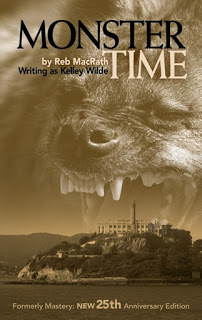
You face a huge cleanup and proofing adventure if you're scanning an old book for conversion into ebook form. And you must be prepared. Those of us who wrote some of our books before we had computers have had to deal with the issues and can tell you a few tales.
I'll limit this blog to the proofing adventures I had with MonsterTime: formerly Mastery, published in 1991. At 125,000 words, it was my longest novel. And, lacking the time and equipment, I paid my formatter to scan it. This turned out to to be a smart decision, since Yvonne Betancourt also performed an extensive preliminary cleanup job.
In the scanning process, as I'd been warned by other writers, all kinds of crazy things happen. And Yvonne took care of the obvious things: freaky line breaks, appearances of nonsense signs like
# # % & @@@ & .
The text had also included typographical stunts: attempting to capture, for instance, the sound of a hyena's whoop. And Yvonne had lovingly preserved these bits. Well, you might wonder sensibly, what was left for me to do. The devil's own work is the answer.

Throughout the entire text the number 1 had converted to I. At the start of any word, the letter f had converted to H. Quote marks were randomly reversed. Periods appeared in the middle of words. Random letters were italicized. And, though I was working from memory, every now and then I knew that words had got lost in the scanning. Once, I was so confused by one paragraph that I knew it was missing a sentence or two. In places, the paragraphing itself seemed confused.
All that said, you'll note that I did call this an adventure rather than an ordeal. Since I was also doing a major rewrite as I went, I welcomed the chance to rethink the novel--without using the paperback original as my safety net. I had the rare opportunity to look freshly at each word--rethinking the sense while I looked for mistakes.
The entire process has taken me three months. And I don't regret one day. The 25th Anny Edition of the book that had been Mastery is 10,000 words shorter--and far better, I think, in all ways.
Two last Kelley Wilde horror novels remain to be rewritten. They too will have to be scanned. No complaints. But I'll tell you, honestly, I'll wait a year till beginning the next! Meanwhile, I celebrate next Month's release of:

Published on June 23, 2015 06:23
June 12, 2015
How to Get the Most From a Strained Back

The 3-step MacRathian Plan--ACT--resulted from back strain caused by not lifting properly the night before.
Acceptance:
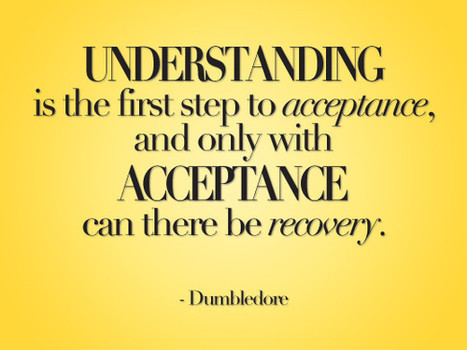
1) I needed to get as much rest as possible, time off from sitting before a computer for hours.
2) I needed to accept, chin up, responsibility for the injury.
3) I also needed to accept secondary causes: weight gain in Seattle (working late shifts in The Store, shelves loaded with junk food...and now sitting in an office, suffering from the nibbles)...slippage from religious workouts and stretching, etc.
Conversion:
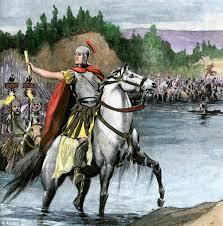
I found myself faced with two choices--and a real sense of urgency,
1) Decision A: I could rest my back for a day, then return to work and my life as was.
2) Decision B: I could convert this into a mosaic in which the back strain was only one tile. Still other tesserae included physical issues that had troubled me for years--and which too, I was convinced, were food-related. After all, I'd whipped the same issues before when I was eating mostly raw...
The decision seemed a no-brainer: the chance to convert an injury into a golden mosaic of health and positivity. But I only had one day off work--and I knew all too well, from my own experience, how quickly the best intentions slide.
Luckily, the MacRathian Plan stumbled onto its third leg:
Transcendence:
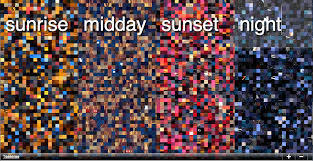
If I worked with the tesserae in the right order and spirit, all the little bits and pieces could support each other--and the process could transcend discouragement and fear of defeat. Like this:
1) I called out from work this morning, then ate my last chocolate bar. (Goodbye, old friend--my love, my Dove!) Then, while I wrote for an hour, I enjoyed the only two decaf coffees I'll allow myself each day. (Theory: I believe the acid in coffee, even decaf, causes a craving for sweets to neutralize the acids.)
2) I decided to fast for one day, since I had ample time to rest and even go to bed early. Weight loss from previous 1-day fasts had always been 2-3 pounds. And the first day is the toughest.
3) I decided to set myself up properly for the return to work: I bought a fresh salad and made a custom snack pack: celery, carrot sticks and apples to nibble on all day.
4) I worked for two hours in the library, free of food temptation.
5) Next, I bought containers in which to store cut-up apples or other fruits/veggies.
6) I returned, for the first time in months, to Pike Place Market to shop for fruit and juicing ingredients.
7) Tonight, after finishing this blog, I'll stop off for a cup of tea and put some more time in on my
WIP's second draft.
8) I'll hit the sack by 7:00 to give my back 9 hours' more rest and to stay out of harm's way with evening food temptations.
Tile by tile, day by day, this golden mosaic will happen.
Published on June 12, 2015 05:00
June 4, 2015
The Great Mustache That Wasn't
Let us begin with a gallery of a few of the world's greatest 'staches. These hair lips are so renowned that I don't need to give you the names:

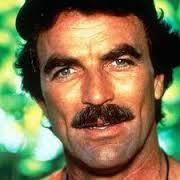
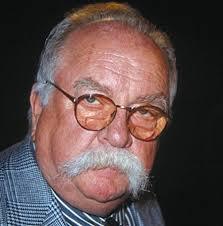
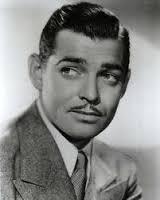
[image error]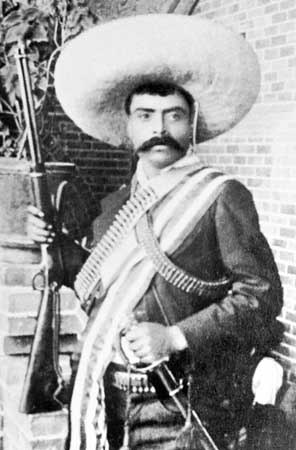
And one of my own favorites:

All right, all right. I don't imagine you've missed more than one or two of those. But the most iconic 'stache of all is one that most of us have missed...but in a different way, You'll recognize it a glance, even without the man's mug:
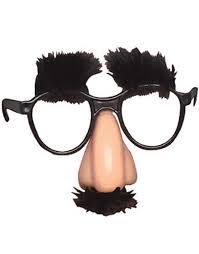
Why, yes, of course: it's Groucho Marx! But is it really? Check out these two photos of Groucho. The one that I'd remembered is shown on the right.
[image error]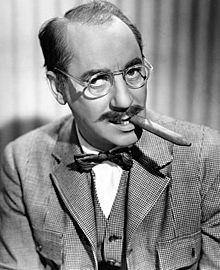
But the other night I re-met the young actor on the left while watching a Marx Brothers film. And something surpassingly strange caught my eye: Groucho's mustache appeared to be....well, glistening. Almost like an oil slick. What the devil was that thing?
A little Googling coughed up the answer:
Groucho Marx also used a fake mustache during his years in vaudeville and in the early Marx Brothers movies. However, his was drawn onto his lip with grease paint, containing no hairs or bristles. In later life he grew his own, real mustache. It, along with his cigar and waggling eyebrows, were his famous trademark.
My initial reaction: disappointment, a sense of betrayal. But these feelings passed into a mixed sense of amusement and wonder. The more we dig, the more we learn. But sometimes the digging can be self-defeating. Groucho's off screen walk, I'm sure, was different from his screen walk. So were his eyebrows. But who gives a hoot? If we can't see the greasepaint as part of the magic, the loss is ours.
Similarly, I don't care if Mae West inflated her bosom with enough air to fill up a raft. Nor do I give two dings if an actor uses steroids to get his buff physique or if an author's still a dead ringer for his/her more youthful photo.
In fact, if I may close with another iconic mustache. I still prefer to think of Lawrence Sanders, my favorite author, as he appeared for years and years. Much later photos were less kind. But this one still has majesty and it honors both him and his work.
[image error]
Meanwhile, hey Spirit of Groucho, pass me the damned greasepaint!




[image error]

And one of my own favorites:

All right, all right. I don't imagine you've missed more than one or two of those. But the most iconic 'stache of all is one that most of us have missed...but in a different way, You'll recognize it a glance, even without the man's mug:

Why, yes, of course: it's Groucho Marx! But is it really? Check out these two photos of Groucho. The one that I'd remembered is shown on the right.
[image error]

But the other night I re-met the young actor on the left while watching a Marx Brothers film. And something surpassingly strange caught my eye: Groucho's mustache appeared to be....well, glistening. Almost like an oil slick. What the devil was that thing?
A little Googling coughed up the answer:
Groucho Marx also used a fake mustache during his years in vaudeville and in the early Marx Brothers movies. However, his was drawn onto his lip with grease paint, containing no hairs or bristles. In later life he grew his own, real mustache. It, along with his cigar and waggling eyebrows, were his famous trademark.
My initial reaction: disappointment, a sense of betrayal. But these feelings passed into a mixed sense of amusement and wonder. The more we dig, the more we learn. But sometimes the digging can be self-defeating. Groucho's off screen walk, I'm sure, was different from his screen walk. So were his eyebrows. But who gives a hoot? If we can't see the greasepaint as part of the magic, the loss is ours.
Similarly, I don't care if Mae West inflated her bosom with enough air to fill up a raft. Nor do I give two dings if an actor uses steroids to get his buff physique or if an author's still a dead ringer for his/her more youthful photo.
In fact, if I may close with another iconic mustache. I still prefer to think of Lawrence Sanders, my favorite author, as he appeared for years and years. Much later photos were less kind. But this one still has majesty and it honors both him and his work.
[image error]
Meanwhile, hey Spirit of Groucho, pass me the damned greasepaint!
Published on June 04, 2015 05:00
May 21, 2015
Don't Let the Name Game Whup You

I pay a lot more attention to names than I did in 1981, when I published my third horror novel under the name Kelley Wilde. And as I rewrite Mastery for its 25th anny edition, I'm struck by how my handling of the Name Game sums my professional growth.
Let's begin with the title and cover. Dell did a fine job with the artwork, I thought, but the title had not been my choice. I'd picked Monster Time for several reasons: Years before the Disney animated film, the title had been fresh...It signaled Horror loud and clear, while also hinting that time was one of the monsters (and this was a time travel thriller)...Finally, Monster Time turns out to be the title of a newspaper column that plays a key part in the plot...Mastery, on the other hand, gave readers nothing to go on--and the word itself plays a very small part in the story.
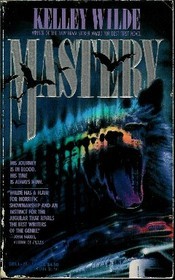
My new cover designer, Jean Schweikhard, convinced me of the need for a simpler and more focused cover, one clearly linked to key plot points. And we settled on a more elegant and mysterious illo combining Halley's comet...the great San Francisco earthquake...and a subtle suggestion of fangs. My original title, I'm convinced, will do the rest of the work.
But, not to confuse readers, I had to deal with Disney, which had never heard of me or my title Monster Time. I opted for MonsterTime. The best compromise I could think of. And why not? There's room for both Disney and me here.
Give readers a break with the characters' names. I was shocked to see how sloppy and thoughtless of readers I was all those years ago. I may have scored high marks for style, but time and again I flunked in my handling of the Name Game.

Frequently, my ear led me astray. For instance, I'd change Lenny to Len now and then for no other reason than rhythm. Worse, now and then--for the same reason--I'd call a character by his last name instead of his first. Far worse, one character alone was called by his last name.
But readers, I'd come to see, need clear reasons for any such changes. Similarly, most readers will be confused when a character is called by his full name here, his last name there, and then his first name here and there. If the reason is thought out, it can be effective. For instance: my character thinks of the vampire, Austin Blacke, as Blacke...and fears him. But then, toward the end, he begins to humanize the vamp by thinking of him as Austin--reducing him to a more manageable scale.
More than one name. My hero in MonsterTime is a likable, but roguish, detective named Dodge. Early in the book we're told that his birth name was Raphael. Two hundred pages later, an old friend trying to rouse him from a funk, calls out to him "Hey, Raphael!" In the revision I took the necessary time to add: 'The sound of my birth name stopped my ranting cold.' Don't tax readers' memories, especially at a key dramatic moment.
When in doubt, take the time to avoid the following dreaded reaction:
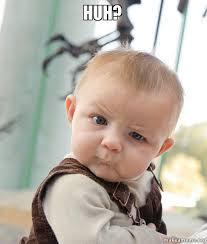
I set out long ago with a good list of narrative values: speed, power, dramatic impact, suspense...and to these, at last, I add:

Published on May 21, 2015 06:00
May 6, 2015
Blood and Rue 2: The Ripsnorting Conclusion
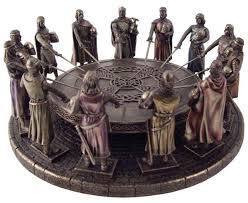
Welcome back. In Part 1, six well-known writers gathered to discuss the subject of violence in art. The 'chat' attracted more than 4000 readers. Today the knights have reassembled to joust with the final five questions.
Once again, the participants are:
Russell Blake
The New York Times and USA Today bestselling author of over 35 adventure thriller novels also co-authored two books with Clive Cussler. He lives in Mexico with his dogs and a bad attitude.
Claude Bouchard
Completed his studies at McGill University and worked in management for countless years. From there, it was a logical career step to stay home and write crime thrillers.
Bill Kirton
Lecturer, actor, director, playwright, novelist, husband, father, grandfather. Sails, eats, drinks wine, gardens. Writes whydunnits and whodunnits. Thinks laughter is very important.
John Logan
The author of 6 novels has published stories worldwide in anthologies by Picador and Vintage, also appearing in the Edinburgh Review and other journals. A proud Highlander.
Brad Strickland
Recently retired from a career as a University professor. Also known as Ken McKea, writer of the series of hardboiled Florida mysteries featuring Jim Dallas.
And a new sixth knight:
Lev Butts
Published work includes Emily's Stitches and the award-winning Guns of the Wasteland. He teaches literature and composition at the Gainesville campus of the University of Georgia.
Lev's words about the transition:
Due to personal reasons, Richard Monaco had to withdraw from the panel. I have been asked to take his place for this second round of questions. Richard has always been a literary idol of mine, even before I got to meet him a few years ago. I grew up reading first his Parsival series, then anything by him I could find. It has been a dream come true to work with him over the last couple of years to get more of his work back into print.
I hope I do him proud with my answers.
All right, then. Here we go, returning to alphabetical order.
******
6) Some can some can't--get away with murder or even a lot worse. Hannibal is compelling no matter what he does. And our eyes remain riveted on Jimmy Cagney dragging a femme by the hair or mashing a graqpefruit in her fac.e A certain something about the way it's acted/written/directed allows us to be thrilled, even when appalled. What is that 'certain something'--charisma, charm, wit...what?
Blake
The secret is to create a character with sufficient depth that you're fascinated by him/her, even if he's a monster. Hannibal is compelling because he's so damned multi-faceted and real seeming. In my own work, the super assassin El Rey is a cold-blooded killing machine, but he's also really interesting and 3D. The trick to making a killer or monster whom we'll follow is to imbue him with qualities that force the reader to turn the page to find out what he's going to do next, and to care.
Bouchard
I’ll respond to this in terms of my own writing and can easily zero in on wit. After all, who wants a killer who doesn't have a sense of humor? If there’s one thing I enjoy when my wife is giving a new work of mine a first read, it’s hearing her suddenly burst out in laughter. When this happens, it’s generally because she’s reading a scene where the killer made some hilarious comment while in the process of dealing with a soon-to-be victim. Nobody can say my killer isn't a funny guy… and he’s also polite.
Butts
For characters like Hannibal or Dexter, I think it is a blend of all three with a little bit of wish fulfilment as well. These characters get to do what most of us wish we could do: destroy our enemies in the most gruesome, cathartic manner possible. These guys do horrible things, yes, but they don’t do them indiscriminantly. Their victims, for the most part “deserved” it: Hannibal is our id destroying those who hurt our pride through insensitivity or rudeness, Dexter is our avenging angel who exacts gory justice on those evildoers who manage to slip through the cracks of our justice system.
Kirton
I think you've covered it--charisma, charm, wit. But it's the sort of question where input from women (writers and readers) would be interesting. My answer to question 8 may explain in part why I say that. From my male perspective, if I ever do find myself captivated by a character who's inflicting harm or worse on someone else, I feel guilty. Fortunately, it doesn't happen very often. I suppose if it were a vigilante wreaking vengeance on a pedophile or someone who;d killed or harmed friends or family, the moral dimension would make it acceptable, even desirable. But if the intention is to appall or excite in the name of entertainment, then I think there needs to be some corrective. There's already a shortage of empathy in the world and to accept tacitly that it's OK for one individual to abuse or obliterate another is to add to the inhumanity quotient.
There are exceptions. Violence, in Tom Sharpe's early novels, was so extreme that its effects were comic. It occurred in contexts which weren't intended to convey realism, and whose characters went to caricatural extremes. The 'sadism' of Patrick Bateman was different. It was simply part of a general lifestyle (shared by others in the novel) and helped, symbolically and powerfully, to convey the notion that society's values have changed and we're losing our humanity.
And yet, venturing into such areas is part of what writers do. As Baudelaire put it, we should 'go into the depths of the unknown to look for something new.'
Logan
I'm reminded of Lee Marvin in the 1967 film, Point Blank, directed by John Boorman (and based on the novel, The Hunter, by Donald E. Westlake). Marvin, as Walker, has been double-crossed and left for dead. Walker has been betrayed by his wife and best friend. He sets out to exact revenge, but als to regain the precise amount of money that has been 'stolen' from him, $93000. It becomes almost comical, throughout the film, when Walker comes up against adversaries who cannot believe he would be creating such mayhem for 'only' $93000, which to the adversaries is small change. But to Walker, this is the figure he has decided on as his own 'valuation' in life. Walker does terrible things, but we know why, and the brutal simplicity of his goal lures the view into sympathizing with the insane purposefulness that drives Walker (even down to one film critic who saw the purposefulness manifested in Walker's actual way of walking in the film when the camera lingers on his pavement-whacking shoes.)
So, perhaps not charisma, charm, or wit finally...but instead a deadly earnest intent, a pursuit of a definite purpose or goal, this is something we can relate to, even find ourselves inspired by, even if we do not agree with that goal objectively.
It may be important also that Marvin brought real WW2 experience of violence to his onscreen roles.
For a literary example of making the unpalatable palatable, Jim Thompson's novels, on the other hand, often told from the viewpoint of the psychotic, unreliable narrator, manage to achieve fascination by representing the shocking twists and turns of an innately wild and feral state of consciousness, which becomes enthralling to the reader just because of this very alien-ness, The readers cannot bring themselves to look away and miss the next unpredictable event or thought.
Strickland
I can think of a few possibilities. First, yeah, the trope that good women love bad men has truth in it--and for both genders there's the Byronic appeal of a character who gives not one solitary faint damn for the restrictions of social convention and the law. Let's face it, some actors also just have that element of self-assurance, of delight in their own power and control, that might make us wish we could be a Cagney, or even a manipulative Karloff or a suavely sinister Vincent Price Same holds true for the women, of course--the best of the bad girls could make men think, "Man, I'd like to tame her" and women think "You go, girl!" Helena Bonham Carter can take such pure glee in mayhem that it's hard not to root for her; that sweet mermaid Daryl Hannah was incredibly stylish as cold-blooded assassin Elle Driver; and I have to, just have to, put in a good word for Margaret Hamilton, whose Wicked Witch of the West treasured her 'beautiful wickedness.' It's hard not to admire such single-minded, driven characters--thanks to the actors who give them life.
Even so, most of us, I think, have the sense to know that it's better to daydream about being such a character than setting out to follow the actual career path, though. "Interesting responses, and your test scores are impressive. So if you go with our firm, where do you see yourself in five years?" "Oh, drenched in other people's blood and cackling maniacally."
Still, reading about such characters, or seeing them on screen, lets the audience release tensions, disperse their accumulated bad humours, and reach what Aristotle called a catharsis--though that literally means puking. Some part of the human psyche loves to be titillated and teased with beyond-the-pale behavior. Stephen King wrote somewhere that reading about such horrors is our way of feeding the gators, keepin' 'em down in the cellar where they can't really hurt us, and he has something there.
Then too--well, 99% of the time, a rollercoaster's a safe ride, innit? You're not expecting that the gawky kid in the car ahead will jump up and be decapitated at the top of the second hill, or that the heavy woman two cars back will suffer a coronary, or that a freak wind will blow a high-tension wire across the tracks and send ninety bazillion volts through you...And that never happens.
Well, hardly ever.
Similarly, we're seated in our coaster cars when we read or watch violent actions. Eyeballs pop and frizzle, blood flows like champagne (which, as is well known, flows like water), carnage ensues...but not for US. We're safe on our comfy butts there in the coaster car, riding the rails of our imagination, and on some level we know that. Exposing our imaginations to the worst that humans can do to humans--that's running up and flat-hand slapping the front door of the Boo Radley place, it's dropping a clattering gold cup while plundering a snoozing dragon's hoard, it's the good old boy at the wheel next to you saying "Hold may beer 'n watch this!" It's a scare that we enjoy, somehow--all the more so since we know we're really safe. Mostly safe.
7) All-out hardcore gore fests--e.g. 2000 Maniacs (1964)--appeal to extreme horror fans while outraging gentler souls. Still, a film or book that wants it both ways--extreme violence for profits and a moral message for approval--seems even more offensive. (E.g., a splatter film which the hit man pauses between kills to brood on the bad things he's done and is about to do again.) Can you think of a book/film perfectly combining graphic violence with either a strong theme or moral center?
Blake
Sure. Easy. Rambo. Innocent everyman taken on by a corrupt system and serving up a ten course meal of whup ass. Although No Country For Old Men is hard to beat for graphic violence with a strong theme (greed ultimately backfires and thus is bad).
Bouchard
I have never been a fan of horror or gore so books and films portraying extreme graphic violence have never appealed to me. Defined, graphic violence is the depiction of especially vivid, brutal and realistic acts of violence in visual media. I consider this definition does not imply the obligation to include blood and guts beyond what may be required to realistically portray any given scene.
That said, and considering film and television have not been a large part of my life for several years, the first film which came to mind upon reading this question is Spielberg’s 1971 Duel. The film is an extremely realistic depiction of good overcoming evil against all odds in the classic David and Goliath genre. Though no heads explode, nor are any bodies ripped apart, one cannot deny this movie’s violent content. A 1955 Peterbilt does make for a rather nasty weapon.
Butts
Anything by Cormac McCarthy, especially No Country for Old Men, which uses its violence to underscore the horrors of growing old, or The Road, which uses violence to illustrate what a thin veneer of civility our social structure provides us and to show how easy it would be to revert back to savages (a theme I think Walking Dead plays around with quite effectively as well).
Kirton
I’m struggling here and my first thought was ‘No, I can’t’. On the other hand, some of the things that are happening in the world today convey extremes of violence on one side which seem counterbalanced by righteous indignation on the other. If that’s how the world is, there must be films and books which convey it. And, in fact, these events are presented to us as narratives by journalists and spokespersons of the various factions. But the convenient way in which they divide protagonists into good guys and bad guys is misleading. The killing of hostages, the suppression of beliefs opposed to one’s own, even the posting of death threats on Twitter – in nearly all cases, the perpetrators think what they’re doing is ‘right’; it fits their morality, furthers their cause and beliefs. In the field of morality there are no global absolutes. When diametrically opposed moralities clash, there can be no redemption.
And how about the Greek tragedies? All those wives, sons, mothers, fathers killing one another to avenge a son, sister, mother, father – all doing so at the behest of one or other of their Gods and finding, as a result, that they’re cursed by another. It seems you can please all of the Gods some of the time or some of the Gods all of the time. But you can’t please all of the Gods all of the time.
Logan
Several come to mind.
Sam Peckinpah’s Pat Garrett and Billy the Kid successfully presents the film’s graphic violence in a context of eulogy, to a time and place long vanished, and to a wild, free way of life on the 1881 Western frontier about to be permanently regulated and curtailed by the new forces of law and order, heralded in by the external imposition of power by the wealthy New Mexico cattle barons.
An interesting counterpoint to this is the later film, Three Days of the Condor, set in a 1975 of CIA shenanigans and looming oil shortages, a time where that nascent frontier law and order has hardened and warped into an edifice perhaps worse than the lawlessness which preceded it, and where the hunted Robert Redford character can no longer tell where American law and order ends and corporate business interests begin.
Another great 1975 genre film is Walter Hill’s Hard Times, which shows Charles Bronson’s Chaney character fighting with his fists, for survival, and for his next meal…in a 1930s Depression-era America which will allow him no other way forward.
Strickland
Macbeth, or course—the slaughter of the innocents, Duncan weltering in his own gore, Macbeth hopelessly realizing he’s waded so far in blood that he might as well forge ahead and hope to reach the other side . . . his wife losing her mind and—maybe—taking her own life, leading to his crashing realization that he’s done all his dirty work for her. . . for nothing, now! And tomorrow, and tomorrow, and tomorrow creeps in this petty pace to the last syllable of recorded time, and life’s a walking shadow, a mere actor who says his lines and then vanishes from the stage; life is a tale told by an idiot, full of sound and fury and signifying—nothing!
You can’t even hear the devil laughing.
That is bleak. It’s fully as bleak as Waiting for Godot, a more modern theatrical take on cosmic indifference to human suffering. All the violence, all the excesses, lead Macbeth to ask a despairing question: What is the point of it all? The work reminds us to be aware not only of our desires and ambitions, but of the world around us. Some characters in the play are honorable and worthy of respect. One lad dies a hero’s death and his own father says he cannot mourn because he is proud of the boy. But Macbeth himself is ignominiously slaughtered, beheaded, and made a shameful public spectacle after his death. The play Macbeth tells us that if the universe has no point for our lives, it’s up to us to make a point for ourselves—and we don’t do that by letting ourselves become monsters.
King Lear is even bleaker,
8) Do you have a violent scene you've been tempted to write for years--but which you fear is just 'too much'? Do you dare to tell us about it?
Blake
Not really. My first passes on Fatal Exchange were pretty graphic but I softened them on drafts. Same for some of King of Swords--what first went on the page had me wincing, but I quickly discovered that the audience that bought American Psycho wasn't buying my books, and the graphic stuff was unnecessary, and in fact harmful, to sales. So I stopped writing to shock the reader and focused on entertaining them. If the characters and stories are compelling, there's no need to shock 'em.
Bouchard
To be blunt, no, I don’t. As I mentioned in the previous question and during our first round, violence for the sake of violence is not my style or forte so I've never been compelled to write anything more vicious than I actually did for any particular scene. While working on Thirteen to None, the eighth of my series, I sometimes had the impression some scenes were more violent than those in my previous works but was never uncomfortable with the results as they were required to paint the portrait I wanted to present to my readers.
Butts
I don’t really. I grew up reading Raymond Chandler and Richard Monaco as well as Stephen King, so I had very little idea that violence (or sex for that matter) were any kind of taboo subject for writing. My problem has always been describing them realistically. I have written three major fight scenes, two of them particularly gory (I have noticed that I have a penchant for gouging out eyes). These scenes and the one sex scene I have written were the certainly the hardest writing I’ve ever done. I essentially had to go back and read several other scenes by different writers, and borrow details from them, making them fit my own style and plot needs.
FYI: If anyone’s interested, my first fight scene is in the story “Misdirection” found in my fiction collection, Emily’s Stitches: The Confessions of Thomas Calloway (my first sex scene is also in that collection). My second fight scene is the fistfight between Ardiss Drake and Lancaster
O’Loch in the first Guns of the Waste Land novella. The third fight scene is a Comanche attack I wrote last week for the second Guns of the Waste Land novella.
Kirton
Yes, and I've actually written it. It came about as a result of a conversation with a female friend who said she believed pain was an essential part of sexual gratification. I didn't find her argument all that convincing because to me it sounded like the old joke about banging your head against a wall in order to feel how good it was when you stopped. Nonetheless, I wrote a scene (not a complete story) to test whether she found it palatable. It was set in a hotel room where the lovers (and they did love one another) met. There was champagne, roses, all the clichés, and I twisted them into the actual implements he used to hurt her. It was way beyond anything I'd ever dream of publishing but I made it as realistic as I could, including not allowing him to get any pleasure out of it and doing things which were against his nature but which she claimed she wanted. In the end, my friend said it was a true reflection of what she meant but that it had gone too far in one or two places. More interestingly, I didn’t like myself for having written it. It suggested that there are muddy layers in me which I’d rather not know about.
Logan
No.
Strickland
How about this one: A guy, trying to escape some great evil, plunges through a door. It leads to a slide, like a kiddie playground slide, but it’s steep and long. I mean it goes down for like fifty floors of a skyscraper. And before he reaches the end of the first ten, he becomes aware that he’s balanced on the thing, but it’s rapidly becoming narrower…and then he sees that just below it narrows to a razor edge….
9) Now, for the reverse. Is there any scene or passage, in any book or film, that you feel was either wrongly done...or something that should have been scrapped? Why?
Blake
About 90% of what Hollywood puts out if formulaic crap that should be flushed. I mean, I get the wisdom of making blockbusters that appeal to males 15-25 who have IQs slightly above that of sand who wish for nothing but thinly disguised violent morality tales featuring the toys they played with as children come to life, but is the human condition any better for it? I can't really go into detail of what's wrong with filmmaking by committee as it would take a book, but yikes. Easier to call out guys who do it right as there are so few. Tarantino being top of my list.
Bouchard
Absolutely; several, in fact. I've always been a proponent of realism and the genres which I generally
read are those with stories which could in fact happen. However, once in a while, authors have managed, inadvertently or otherwise, to include elements or scenes which caused me to shake my head and say, “Really?” Without naming names, I will specify I’m speaking of big time, traditionally published authors who, in my opinion, committed these faux-pas. For example, I have difficulty accepting a character getting a shotgun blast to the side of the face followed by a .38-caliber bullet to the chest… and surviving, particularly because his massive pecs stopped the slug. This second one is even funnier. The killer is driving a car-jacked taxi in NYC. A hostage is in the passenger seat and, behind the protective screen, two young boys are tied up on the floor in the back. The killer pulls to the curb and somehow manages to wrap himself and his three hostages into a four-man bundle with explosive cord before exiting the vehicle.
Butts
I can’t really think of one, no. Though I have been reading some early Westerns (like 1880’s and earlier) and some of those fights seem overly simplistic and too cartoonish.
Kirton
There’s one stand-out image that’s stayed with me for many years. I couldn't say it was wrong or misplaced, but its impact was such that it resonated through the rest of the film and got in the way of whatever ‘meaning’ was supposed to be there. The film opens with a man sharpening and testing a razor. We then see him holding a young, expressionless woman, who’s staring straight ahead. His fingers hold her left eye open then there’s an awful close-up of the razor slitting open the eyeball, causing stuff to spill out of it. It is, of course, the opening of the surrealist film Un Chien Andalou by Bunuel/Dali. I remember nothing of the rest of the film, but merely recalling that cut brings back the shivers. Whatever the intention, it was so gross and so powerful that it overwhelmed everything that followed it.
Logan
In the 2005 Australian horror film, Wolf Creek, there is a scene where Mick Taylor, played by John Jarratt…well, perhaps I’ll just quote this from the film’s wiki entry:
“Liz…gets into a car and attempts to start it, but Mick shows up in the back seat and stabs her through the driver's seat with a large knife. After more bragging, he hacks three of Liz's fingers off in one swipe, then picks her up and headbutts her into near unconsciousness. He then severs her spinal cord with a knife, paralyzing her and rendering her a "head on a stick." Mick then proceeds to interrogate her as to Kristy's whereabouts.
It felt wrongly handled when I watched it, so I looked it up online and saw that may people had walked out of the cinema during the original screenings. The film was also ambiguously marketed as being ‘based on true events’; the plot bore elements similar to the real-life murders of tourists in Australia by Ivan Milat in the 1990s and by Bradley Murdoch in 2001.
So, not just “violence porn” placing a young female character in a very prolonged and hopeless position of torture/horror/humiliation/mutilation/physical destruction, but trying to connect up this “fiction” “generically” with true-life murders that bear no real relation, in terms of specifics or persons.
Strickland
There’s stuff I haven’t liked, but that’s not quite what you’re asking. I saw the first Night of the Living Dead ages ago in a theater, and some of the cannibalistic scenes I thought were not well-done, not because they were gross, but because they grew repetitive and the shock dulled off. In my own brief film career I appeared as an extra in a low-budget horror flick entitled Blood Salvage in the U.S. and Mad Jake in Europe. The plot involved a backwoods mechanic and his two deranged sons; they would sabotage cars passing through their small town, tow them into their shop, and then abduct the drivers and passengers and…raid the passengers for spare parts. Kidneys, livers, lungs, and so on. And they’d keep the mutilated victims alive as long as possible by hooking them to mechanical equivalents for their missing organs, Rube Goldberg devices cobbled together from used-car parts.
So okay, the bit I didn't care for…there’s a brief tour through the barn where all the semi-living victims are lying moaning and pleading for death. It is unsettling. And the camera pans past…Elvis, hooked to a radiator and a jukebox.
The goofiness mixed with the horror wasn't even camp. It was just somewhere way out in the woods.
10) Knights' call. Choose your own last question--and a wild, signature answer.
Blake
Question: Is violence in art something that should be regulated or censored to fit societal mores?
Answer: Well, hmm. I like to think of all markets as weighing machines. The job of artists, who are basically entertainers, is to entertain. If a society finds something like graphic violence to be titillating, it will vote with its wallets. I deeply dislike the idea of curators or gatekeepers deciding what society should and shouldn't see for its own good. As an example, I believe that TV viewers in the U.S. should be able to see children with their legs blown off, half their heads splattered against a tree, in pools of their own blood, as a result of one of our bombing runs. By sanitizing the world for the good of society, we make palatable that which is essentially unpalatable. War is now a series of cool explosions and guided missiles we can watch from the comfort of our armchair. But that's a lie. War is ugly and brutal and awful and should be avoided at all costs, because it's the ultimate expression of our failure as a species to think our way through problems. We sanitize it so it's softened, comfy, it becomes easier to justify and support. Go back and look at the grim determination of wartime photos of generals from WW1 and WW2, and contrast them to the smiles and waves of our current breed of leaders, none of whom has ever been in a trench. Nobody was happy about having to go and take human life back then, and now it's almost like watching sports for some, where there's "our team" and "them" and we're hopeful ours kills the bastards. Taking human life is horrific, and I don't think that simplifying it to sanitized sound bites does any of us good service. Anything we can do to bring that reality home, might make it way harder to "support our troops" and wave flags and cheer at our superiority, but who cares? Is our job as entertainers really to gloss over the unpleasant and make ugly behavior more palatable, to rationalize our own brutality so we feel better about it? So no, I don't think violence should be censored to protect the children or anyone else, because in the end, the world is and has always been a violent, unpredictable place where bad shit can and does happen, and to portray it as anything but that makes performing unmentionable acts easier. So you want to portray a gang hit popping a cap into a competitor on the news? Fine. Show the suffering that goes with it, the family affected by it, the destruction of lives that's reality, the blood and guts and agony and horror that is the reality of it. Censor it and you turn life into a cartoon, and turn consumers of the entertainment into overfed adult children who believe everything's round edges and characters that drop off cliffs only to pop up unharmed in the next scene.
Bouchard
Question: If you had come to the world as Theodor Seuss Geisel, better known as Dr. Seuss, would you have still been inclined to write crime thrillers and, if yes, can you give us a sample of what your prose would have been like?
Answer: I definitely would have written crime thrillers as Dr. Seuss. Consider the following sample of an actual passage from Vigilante, my first novel, rewritten à la Seuss:
The blow had knocked old Myers out
And sent him to the ground.
When he awoke, he was bound and gagged.
He couldn't make a sound.
His mind was dull, his skin felt wet,
And his face really hurt.
When he wiped his chin upon his shoulder
There were bloodstains on his shirt
He raised his head and saw the man,
Looking quite serene,
Standing there behind the couch
As he browsed a magazine.
“Ah, there you are,” the intruder said.
“I think that’s really great.
“I was hoping you wouldn't sleep too long,
“I don’t want to get home too late.”
The man strolled up to Myers
And gave him a cheerful grin.
“I hope you will forgive me
“For the sorry state you’re in.”
“But what you did to Mrs. Slater
“Wasn’t really nice at all.
“You know she'll never walk again
“Because of that nasty fall.”
“I was thinking you should fall down stairs
“But you really deserve much more.
“That’s why I find it practical
“That we’re up on the sixth floor.”
The man walked to the balcony
Surveying the dark parking below.
He was satisfied to see nobody
No witnesses for the show.
He returned into the apartment
Where Myers struggled on the floor.
He kicked Myers in the abdomen,
Causing Myers to resist no more.
Flinging Myers over his shoulder,
He carried him to the railing.
“Say bye-bye, Peter,” he whispered,
Then sent old Myers sailing.
Down six storeys went Myers,
Landing with a thud.
He lay there as he merited,
Dead in his own blood
Butts
Question: Given my previous answer, I want to talk a bit about slapstick and cartoonish violence. Why does ti work when done well?
Answer: I think it can be effective if used consciously (I think the poor quality of early Western violence lies in a lack writing talent, more than a misuse of cartoon violence). This type of violence is used for comic effect, and it taps into mankind’s natural tendency for schadenfreude. As a species, we do delight in the misfortune of others, especially if those others deserve it. Wile E. Coyote, The three Stooges, even Fred Flintstone, are all kind of jackasses, so the violence that happens to them appeals to our sense of justice.
We also enjoy slapstick when it makes others seem foolish in exactly the way that we have felt foolish ourselves. We laugh at the kid who drops his lunch tray or trips over a banana peel because we’re glad it isn’t us. Because it very well could’ve been us, and almost certainly will be us some time.
Kirton
Question: Could you give us an example of a refined, sophisticated use of violence to convey character and reach the highest peaks of literary excellence and linguistic perfection?’
Answer: In my book, The Sparrow Conundrum, a policeman has rigged his hotel room so that, if anyone tries to enter it, a series of pulleys will trap them under a heavy wardrobe and a bed. Two agents, code names Kestrel (who’s disguised as a maid), and Eagle, know nothing of this, creep in and are trapped. The policemen, Lodgedale, returns in his customary bad mood. Now read on.
Eagle and Kestrel heard the door bang open and their screams became babbles of relief and pleas for help. The relief, of course, was short-lived. Lodgedale noted with satisfaction the heap of bed and wardrobe and with glee the four legs sticking out from under it.
One pair of legs was trousered but the other was bare and seemed to belong to a maid. Lodgedale, ever alert, bent to look at the maid’s crotch and was surprised at how pronounced her mons pubis was. Surprise quickly became suspicion however, and he decided the maid’s gender must be checked.
There were various methods available to him but he stayed in character and aimed a kick at her crotch. Kestrel, whose scrotum was, of course, the target, exploded in areas of pain he’d never before suspected. Like all experimenters, Lodgedale repeated his test in order to verify his first set of results, was equally pleased at the outcome and turned his attention to the trousered crotch which he decided to use as a control group. Eagle’s previous delights had been derived from masochistic fantasies but no stretch of his distorted imagination could interpret the present experiences as pleasurable and the volume of his screaming matched that of Kestrel.
After only a brief period of such gratuitous violence both men fainted and Lodgedale, deprived of the satisfaction of hearing their screams, reluctantly decided to stop and try to discover who they were and why they’d entered his room.
Logan
Question: In the 1975 (again) dystopian sports action science fiction film, Rollerball, directed by Norman Jewison and starring James Caan, set in a 2018 global corporate state, is Rollerball, the violent, globally-popular sport which the then-futuristic society is so enthralled by (just as Roman citizens were once enthralled by the butchery and murderous spectacle of the first century colosseum)…is Rollerball a spectacle which brings about healthy cathartic release in the audience, or is it a spectacle which hypnotizes them and transfixes them into forgetting the underlying violence they are immersed in during their real daily lives, or is Rollerball a spectacle which hardens and desensitizes the crowd to ever-increasing levels of violence…as the crowd becomes ever more bloodthirsty and the rules of the game are incrementally changed to allow greater and greater violence, until James Caan’s Jonathan character refuses to kill his last living opponent and instead does a victory lap of the skate track while the crowd chants his name?
Answer: “The first man to raise a fist is the man who's run out of ideas.”
--H. G. Wells
Strickland
Question: If you could have written a book or script that someone else did, one that involves this kind of violence, what would it be, and why? Do you think you could have done a better job? Tell us about it!
Answer: For me—Well, remember Michael Shea, who passed away about a year ago? His Nifft the Lean got to me on a visceral level. That’s one I can point at and say, “Man, I wish I’d had the guts and the obsessive imagination to write that.”
However, I could not have done a better job. It would take someone with a different psyche from me to beat Shea at that game, but man, I wish I had the inspiration, the twisted vision, and the courage to pull of something like that story.
******
To learn more about the authors and their books, just click on the following links to their Amazon Author Pages.
Russell Blake
US : http://www.amazon.com/Russell-Blake/e/B005OKCOLE
UK: http://www.amazon.co.UK/Russell-Blake/e/B005OKCOLE
Claude Bouchard
US: http://www.amazon.com/Claude-Bouchard/e/B002BLL3RK/ref=sr_tc_2_0?qid=1427640543&sr=1-2-ent
UK: http://www.amazon.co.uk/Claude-Bouchard/e/B002BLL3RK/ref=sr_tc_2_0?qid=1427640612&sr=1-2-ent
Lev Butts
US: www.amazon.com/author/leverettbutts
UK: http://www.amazon.co.uk/Leverett-Butts/e/B00999703I/ref=sr_ntt_srch_lnk_2?qid=1430610987&sr=8-2
Bill Kirton
US: http://www.amazon.com/Bill-Kirton/e/B00D918C2K
UK: http://www.amazon.com/Bill-Kirton/e/B00D918C2K
John Logan
US: http://www.amazon.com/John-A.-A.-Logan/e/B008NTJW54/ref=ntt_athr_dp_pel_pop_1
UK: http://www.amazon.co.uk/John-A.-A.-Logan/e/B008NTJW54/ref=ntt_athr_dp_pel_pop_1
Richard Monaco
US: http://www.amazon.com/Richard-Monaco/e/B001HOSU1Y/ref=sr_ntt_srch_lnk_1?qid=1427465922&sr=8-1
UK: http://www.amazon.co.uk/Richard-Monaco/e/B001HOSU1Y/ref=sr_ntt_srch_lnk_1?qid=1427465974&sr=8-1
Brad Strickland
US: http://www.amazon.com/Ken-McKea/e/B00J22N6PS/ref=sr_tc_2_0?qid=1427207141&sr=1-2-ent
UK:http://www.amazon.co.uk/s/ref=nb_sb_noss?url=search-alias%3Dstripbooks&field-keywords=ken+mckea
Published on May 06, 2015 06:00



